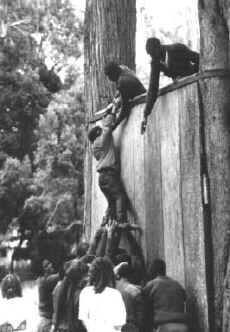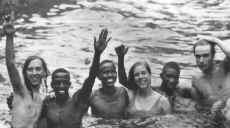Climbing on the mountain
|
|



Kenyan and American youth work together to get over the wall
 | I was scared until a hand grasp mine, and then I was swept upward.
|

 Bounding
toward Kilimanjaro Bounding
toward Kilimanjaro
Jonathan Tourzan
The next day we set off for the Outward Bound Mountain School at Loitokitok, a small
village at the base of Mount Kilimanjaro. Three vans met us at the YMCA to take us on our
excursion.
On our way, we drove through Amboseli Game Park, one of Kenya's richest refuges for
wildlife and one of the best elephant habitats in Kenya. There we saw a variety of animals
including giraffes, elephants, zebras, and wildebeests. We stopped for lunch at a safari
(journey) lodge where we came to the shocking realization that most tourists in Kenya stay
at lodges and have little or no interaction with the native people. We felt out of place
in this luxurious setting.
On the way to Loitokitok, a small storm broke out and turned the narrow, dirt road on
which we were driving into a river of mud. Before we could reach the Outward Bound School,
two vans got stuck on the road. Fortunately, Steven McCormick, the only American working
with the Outward Bound School, came to our aid. Steven pulled the van out of the mud with
his Land-Rover, and, soon after, we arrived safely at School.
Our group was going to join a group of Kenyans who were enlisted in the National Youth
Service (NYS). We would join them for three days of rugged outdoor activities at the
six-thousand foot level of Mt. Kilimanjaro. NYS conscripts young men and women, ages
sixteen to twenty-nine, into a training program similar to the Civilian Conservation
Corps, which existed in the U.S. in the 1930's. The Kenyans receive paramilitary and
civil-construction training before performing essential jobs in the development of their
country. At the end of a two year tour of duty, they are placed in government or civilian
jobs. The NYS Kenyans are patriotic, disciplined, intelligent, and hard working.
We moved into a cabin with eleven bunk beds in rows with shelves for our packs. Each
student took a bed and unloaded his/her pack before going to the mess hall.
Steven warned us about the school. He told us that the days would be very strenuous,
and some activities, such as the difficult parts of the ropes course, would be beyond our
capacity. Steven stressed that we were not compelled to participate in any activity that
we thought was beyond our means, but he encouraged us to test ourselves and to discover
our capabilities. Before we went to bed, we were assigned to patrols consisting of Kenyans
and Americans. In the morning, we would be participating in our activities with these
small groups.
After the meeting, Steven walked down to our cabins and told us to get a good night's
sleep. He told us that we would be getting up at 5:55 A.M.; then he left. He had no way of
knowing that we were going to be awakened much sooner. The recent rains had caused Siafu
(biting ants), or Safari Ants, to uproot and seek higher ground. Our dry cabin was exactly
what they were looking for. Unbeknownst to us, thousands of these large ants began to head
for our cabin.
 Invading Safari Ants Invading Safari Ants
Rebecca Sugg
We have had a long day. Seven hours of pushing matatus through the mud is
|
|
not my idea of easy traveling. We have just
arrived at the Outward Bound school on Mt. Kilimanjaro, and I am thinking to myself how
great a full stomach and a soft bed are going to feel. I wearily walk into our cabin,
choosing what I think will be the best bed in the house, knowing little about the
uninvited guests who would soon claim it. When my head hit the pillow, I was fast asleep.
At four in the morning, I was rudely awakened by a sting on the side of
my neck. Then another sting . . . and more, on my eyelid, in my ear; there were ants
crawling in my hair. “Ouch, slap, ouch, slap, slap, slap, what the . . .?” I was
trying to protect myself, and I wondered if I was the only one getting bitten.
My struggle and the army of ants began to get some attention. Jon Rinard,
who was sleeping diagonal from me, whispered loudly, “Hey, Rebecca, what the hell are
these things anyway?” Then people all around me started slapping and yelling and
shuffling. The noise woke up the rest of the group, but, unfortunately, they were not very
understanding.
“Shut up!” someone yelled from the other side of the room.
“Be quiet! It's no big deal; go back to sleep,” pleaded another
classmate from a lower bunk.
“You guys are exaggerating,” was the muffled response from
inside a nearby sleeping bag.
“Yeah, right!” I thought. Here we are getting devoured by these
things, and all that people can think about is sleeping. Finally, we decided to find out
for ourselves what was attacking us. Jon turned on his flashlight; now everyone started
screaming, yelling, and running to the other side of the room. The huge streams of Safari
Ants had made themselves at home, covering half the room; they had attached themselves to
everything in their sight! Some had even gotten into our sleeping bags. Nobody got much
sleep after that on our first night at Outward Bound.
 Teaching
the Kenyans to swim Teaching
the Kenyans to swim
Dana Jensen
The next morning after our ordeal with the ants, we had to get up at 5:55 A.M. for the
run-and-dip ritual. I crawled out of bed to find my classmates doing warm-up exercises
with the NYS. It was so dark outside that I could hardly see the OBS instructor leading
the exercises, so I watched the people around me and tried to follow. One instructor with
a strong tribal accent yelled: “Squat, face your partner, and jump! One! Two!
Three!” I reluctantly started jumping. After the warm-ups, we ran half a mile up and
down a bumpy dirt road. I was on the verge of collapse, hoping to be unnoticed, when I
felt someone pushing on my back. It was a Kenyan, encouraging me to keep up with him.
I followed him to the swimming pool. It was light now, and I could see that my patrol
was already there. The morning activity seemed to put everyone in a good mood. I smiled at
the irony of hitting cold water at 6:20 A.M. with nothing familiar around me but my
clothing and my classmates. The supervisors, standing on the opposite side of the pool;
told us to stand on the deep end and to help the Kenyans get across the pool, some of them
did not know how to swim. The tough Kenyans, who were good runners and disciplined, seemed
so vulnerable as we got ready to jump.



“Step up! And jump!” yelled the supervisor. All but four people
jumped into the pool. Then I noticed my classmate, Fiona, pushing a big Kenyan to the side
of the pool; I realized that she needed help. He was thrashing in panic. I suddenly felt a
rush of energy; I took a deep breath and went underwater. I swam beneath him and pushed
him to the side of the pool. His head was hanging down, and his dark colored muscles
flexed to cling to the side of the pool. When he had caught his breath, he looked up at me
with wide eyes. I smiled at him and watched his expression turn into a huge grin.
|